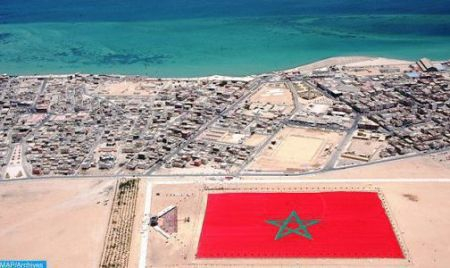UN: Vice-president of Dakhla Oued-Eddahab Region Highlights Socio-economic Development in Moroccan Sahara
Vice-president of the region of Dakhla Oued-Eddahab, Ghalla Bahiya, invited as the democratically elected representative of the southern provinces to the meeting of the Committee of 24 of the United Nations in New York, emphasized the great economic and social development that is taking place in the Moroccan Sahara, saying that this development is benefiting the inhabitants of this region. Speaking before the Committee members, Bahiya explained that the New Development Model for the Southern Provinces of the Kingdom, launched by HM King Mohammed VI, is the backbone of development policies in the Sahara. She said that this model is based on the principle of participation of local populations in the development and implementation of their policies and development plans, in the context of advanced regionalization. This principle, enshrined in the Moroccan Constitution, grants the regions broad prerogatives in the planning and implementation of territorial development projects. Referring to the issue of political participation, Bahiya noted that her presence at the meeting of this Committee attests to the active participation of women and youth in political life in Morocco, particularly at the level of local governance. She also noted that the effective political participation of Moroccan women, especially in the Moroccan Sahara region, is today a tangible reality, as evidenced by the election of several women at local, provincial, regional and national levels. In addition, the vice president of the region of Dakhla Oued-Eddahab noted that in recognition of the colossal socio-economic development achieved in the Moroccan Sahara, 22 countries have opened Consulates General in the cities of Laayoune and Dakhla, noting that these representations will contribute to the promotion of economic and cultural cooperation between Morocco and these countries. In this regard, she noted that the development dynamic currently experienced by the Moroccan Sahara region is irreversible, stressing that the socio-economic development benefits the local population and aims to raise the Sahara region as a regional economic hub. She emphasized in this sense that this socio-economic progress in the Sahara, in the context of advanced regionalization, paves the way for the implementation of the autonomy initiative, presented by the Kingdom of Morocco to the UN, and which has been qualified as serious and credible by the Security Council, since 2007, and supported by a large majority of UN member states Bahiya also stressed the importance of the peaceful intervention of Morocco which has definitively restored the free movement of people and goods at the Guerguerat crossing between Morocco and Mauritania after its blockage by armed militias of the polisario, noting that this intervention has been massively supported and backed by the international community. She insisted on the full respect of human rights in the Moroccan Sahara, whose inhabitants benefit from the guarantees enshrined in the country’s Constitution and in the international conventions on human rights to which Morocco is party. Ghalla Bahiya, vice-president of the Dakhla Oued-Eddahab Region, and Mhamed Abba, vice-president of the Laayoune-Sakia El Hamra Regional Council, have been continuously participating since 2018 in C24 meetings and its regional seminars as democratically elected representatives of the Moroccan Sahara.

